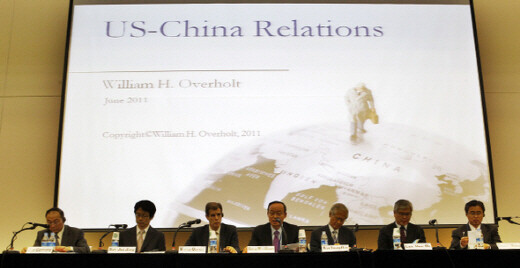hankyoreh
Links to other country sites 다른 나라 사이트 링크
Experts discuss inter-Korean issues at Hankyoreh forum

By Kim Jong-cheol, Senior Staff Writer
An international Hankyoreh-Incheon symposium on “Peace in the West Sea and Cooperation in Northeast Asia” was held Tuesday at Incheon’s Songdo ConvensiA to mark the eleventh anniversary of the June 15 Inter-Korean Joint Declaration.
Appearing as presenters and panelists in a special session Tuesday, former U.S. Assistant Secretary of Defense for Asian and Pacific Security Affairs Wallace Gregson and China Reform Forum senior counselor Pan Zhenqiang said the West Sea should be turned “from a sea of conflict to a sea of peace” for the sake of peace on the Korean Peninsula, and agreed on the need for dialogue with Pyongyang to achieve this.
Gregson expressed astonishment at the fact that the Kaesong Industrial Complex is still operating despite the Cheonan sinking and Yeonpyeong Island artillery attack, while Pan said that if another Hankyoreh-Incheon symposium is held in 2012, the organizers should contact North Korea and make efforts to win them over while hearing out their demands.
But, both men showed considerable disagreement on joint South Korea-U.S. military exercises in the West Sea and other issues.
“The peace process is a reconciliation process,” Pan said. “How you can have reconciliation and military force in tandem?”
“Military drills may coincide with the interests of the United States, but I do not think they are beneficial for South Korea,” Pan added.
Gregson said allied military operations were intended to show the improved capabilities of South Korean and U.S. military cooperation, adding that he disagreed with the view that naval operations were threatening enough to lead to an incident such as the Yeonpyeong Island shelling or Cheonan sinking.
Gregson also emphasized the international community’s sanctions on North Korea through the United Nations, arguing that the Cheonan and Yeonpyeong Island incidents “cannot be justified.”
In the symposium’s first session on the topic of “U.S.-China Relations and the Choice of Korean Diplomacy,” William Overholt, a senior researcher at the Harvard Kennedy School, said that issues such as global environmental protections and the improvement of global trade require closer and more cooperative relations between Beijing and Washington.
Jin Canrong, vice dean of the School of International Studies at Renmin University of China, predicted that China “will develop steadily over the next ten years but face continued uncertainty and confusion, resulting in a process of adjustment in relations between China and the outside world.”
Jae-Jung Suh, professor of Johns Hopkins University, said the South Korean government’s North Korean policy “is realism based in faith and cannot adequately resolve the issues confronting the Korean Peninsula.”
“Now is the time to toss it in the garbage can of history and practice a realism centered on regional politics,” Suh said.
Meanwhile, Joel Wit, a senior researcher at Columbia University who took part in the symposium Tuesday, said in an interview with the Hankyoreh that he did not think either Seoul or Washington was willing to engage in genuine dialogue and declared that the only way the situation would be resolved was if a new government emerged in South Korea and made a new resolution.
Please direct questions or comments to [englishhani@hani.co.kr]
Editorial・opinion
![[Editorial] Does Yoon think the Korean public is wrong? [Editorial] Does Yoon think the Korean public is wrong?](https://flexible.img.hani.co.kr/flexible/normal/500/300/imgdb/original/2024/0417/8517133419684774.jpg) [Editorial] Does Yoon think the Korean public is wrong?
[Editorial] Does Yoon think the Korean public is wrong?![[Editorial] As it bolsters its alliance with US, Japan must be accountable for past [Editorial] As it bolsters its alliance with US, Japan must be accountable for past](https://flexible.img.hani.co.kr/flexible/normal/500/300/imgdb/original/2024/0417/6817133413968321.jpg) [Editorial] As it bolsters its alliance with US, Japan must be accountable for past
[Editorial] As it bolsters its alliance with US, Japan must be accountable for past- [Guest essay] Amending the Constitution is Yoon’s key to leaving office in public’s good graces
- [Editorial] 10 years on, lessons of Sewol tragedy must never be forgotten
- [Column] A death blow to Korea’s prosecutor politics
- [Correspondent’s column] The US and the end of Japanese pacifism
- [Guest essay] How Korea turned its trainee doctors into monsters
- [Guest essay] As someone who helped forge Seoul-Moscow ties, their status today troubles me
- [Editorial] Koreans sent a loud and clear message to Yoon
- [Column] In Korea’s midterm elections, it’s time for accountability
Most viewed articles
- 1[Column] The clock is ticking for Korea’s first lady
- 2Samsung barricades office as unionized workers strike for better conditions
- 3[Editorial] When the choice is kids or career, Korea will never overcome birth rate woes
- 4[Editorial] As it bolsters its alliance with US, Japan must be accountable for past
- 5S. Korea, Japan reaffirm commitment to strengthening trilateral ties with US
- 6[Guest essay] How Korea turned its trainee doctors into monsters
- 7Japan officially says compensation of Korean forced laborers isn’t its responsibility
- 8Why Israel isn’t hitting Iran with immediate retaliation
- 9Worse than worst case: Korea’s population is shrinking faster than predicted
- 10[News analysis] After elections, prosecutorial reform will likely make legislative agenda